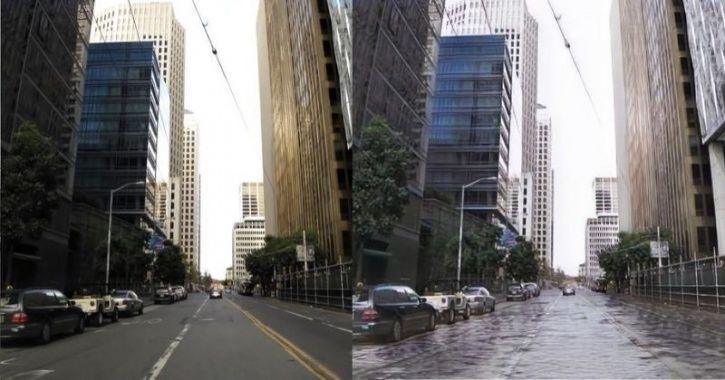Researchers Use AI To Show The Impact Of Climate Change And Rising Sea Level
Harin - Nov 27, 2019

Researchers from Mila Quebc Artifical Intelligence Institute have developed an AI platform showing people the consequences of climate change.
- Google's Project Genie: Premium Subscribers Unlock Interactive AI-Generated Realms
- New ‘Deep Nostalgia’ AI Allow Users To Bring Old Photos To Life
- Pilots Passed Out Mid-Flight, AI Software Got The Aircraft Back Up Automatically
Climate change is impacting different parts of the world. Global warming causes the sea level to rise, leading to many islands might be submerged underwater soon.
But if you live nowhere near the coastlines, you won’t understand how severe the situation is. However, this AI tool might help you with that.
Researchers from Mila Quebc Artifical Intelligence Institute have developed an AI platform capable of showing people how climate change affects their surrounding areas.
Victor Schmidt who is a Ph.D. at Mila and also the paper’s lead author stated that it is difficult for people to understand the severity of climate change when they only read about polar bears and remote areas. However, climate change comes with so many consequences. And everyone is going to be impacted. Schmidt and his team want people to better understand the situation and take action.

With the platform, people can see what the future looks like if they keep on disregard our planet. Users can input street addresses and then see how things will become if a natural disaster happens.
The picture can be a street flooded with water. The water level will depend on if they live close or far from the shore. At the moment, flooding is what the platform is focusing on. However, more difficult scenarios such as wildfires will be added later.
An image-to-image translation algorithm is being used to turn images from Google Street View into pictures of the post-apocalyptic world that we might suffer if we don’t prevent climate change from happening. To make their system more intelligent, the researchers are making use of GAN (generative adversarial network).
Schmidt then added that showing people how badly climate change would affect their surrounding areas was a good way to make climate change less distant and more personal.
Featured Stories

Features - Jan 29, 2026
Permanently Deleting Your Instagram Account: A Complete Step-by-Step Tutorial

Features - Jul 01, 2025
What Are The Fastest Passenger Vehicles Ever Created?

Features - Jun 25, 2025
Japan Hydrogen Breakthrough: Scientists Crack the Clean Energy Code with...

ICT News - Jun 25, 2025
AI Intimidation Tactics: CEOs Turn Flawed Technology Into Employee Fear Machine

Review - Jun 25, 2025
Windows 11 Problems: Is Microsoft's "Best" OS Actually Getting Worse?

Features - Jun 22, 2025
Telegram Founder Pavel Durov Plans to Split $14 Billion Fortune Among 106 Children

ICT News - Jun 22, 2025
Neuralink Telepathy Chip Enables Quadriplegic Rob Greiner to Control Games with...

Features - Jun 21, 2025
This Over $100 Bottle Has Nothing But Fresh Air Inside

Features - Jun 18, 2025
Best Mobile VPN Apps for Gaming 2025: Complete Guide

Features - Jun 18, 2025
A Math Formula Tells Us How Long Everything Will Live
Read more

Mobile- Feb 16, 2026
Xiaomi Launches Affordable Tracker to Compete with Apple's AirTag
For users tired of ecosystem lock-in or high prices, the Xiaomi Tag represents a compelling, no-frills option that delivers core functionality at a fraction of the cost.

ICT News- Feb 18, 2026
Google's Project Toscana: Elevating Pixel Face Unlock to Rival Apple's Face ID
As the smartphone landscape evolves, Google's push toward superior face unlock technology underscores its ambition to close the gap with Apple in user security and convenience.

Mobile- Feb 17, 2026
Anticipating the Samsung Galaxy S26 and S26+: Key Rumors and Specs
The Samsung Galaxy S26 series is on the horizon, sparking excitement among tech enthusiasts.
Comments
Sort by Newest | Popular